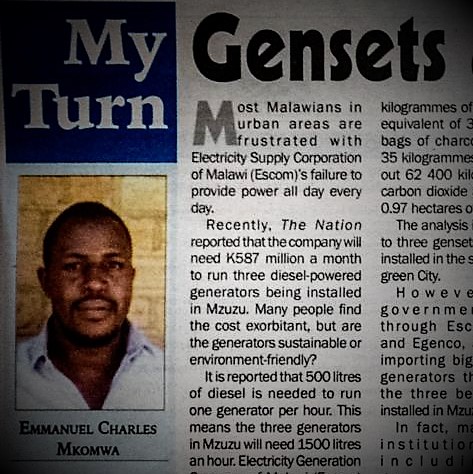
Most Malawians in urban areas are frustrated with Electricity Supply Corporation of Malawi (Escom)’s failure to provide power all day every day.
Recently, The Nation reported that the company will need K587 million a month to run three diesel-powered generators being installed in Mzuzu. Many people find the cost exorbitant, but are the generators sustainable or environment-friendly?
It is reported that 500 litres of diesel is needed to run one generator per hour. This means the three generators in Mzuzu will need 1500 litres an hour. Electricity Generation Company of Malawi (Escom)plans to run the gensets for 16 hours daily. This means 24 000 litres of diesel a day.
Studies have shown that a litre of diesel produces 2.6 kilogrammes of carbon dioxide with complete combustion.
This means 24 000 litres of diesel will produce 62 400 kilogrammes of carbon dioxide a day.
This is no different from unsustainable charcoal production consuming forests across the country.
Almost 13 867 kilogrammes of charcoal—an equivalent of 395 standard bags of charcoal weighing 35 kilogrammes each, churn out 62 400 kilogrammes of carbon dioxide and wipe out 0.97 hectares of forest cover.
The analysis is only limited to three gensets that will be installed in the so-called Ever-green City.
However, government, through Escom and Egenco, are importing bigger generators than the three being installed in Mzuzu.
In fact, many institutions, including government agencies and companies, are using gensets all day to reduce the impact of lengthy blackouts.
This means more carbon dioxide is being released into the atmosphere.
Carbon dioxide is one of the greenhouse gases which cause global warming and climate change.
Although Malawi is not a net emitter of greenhouse gases, both charcoal production and use of diesel-powered generators result in environmental degradation, especially air pollution.
Environmental problems transcend national boundaries and climate change severely affects people’s livelihoods through dry spells, seasonal droughts, intense rainfall, riverine floods, flush floods and other hazards.
Droughts and floods are increasing in frequency, intensity and magnitude over time, disrupting livelihoods of both rural and urban Malawians.
Climate-related disasters adversely affect agriculture, food security, education, housing, cultural diversity, water and forests.
Government has been implementing various initiatives, including National Climate Change Programme (NCCP), to enhance vulnerable communities’ resilience and capacity to adapt to climate-related shocks.
The installation and use of diesel powered generators is in conflict with these climate change management initiatives.
There is a need for government to organise itself to save the world from greenhouse gases.
There is a need for more consultations and collaboration among government agencies and key players in energy sector. The following are suggested ways on how the government can deal with electricity challenges.
Government, through Egenco, should partner and support local engineers who have developed mini-hydro power plants to reduce the power deficit.
Some of them are Hastings Mkandawire of Turbines Energy Company who has installed a 100-kilowatt power plant on Nkhokoma River in Nkhata Bay and Cored Nkosi’s 600 volts hydroelectric power plant on Kasangazi River in Mzimba. Government should conduct capacity and feasibility assessments to upgrade the mini-hydropower stations and guide them on necessary steps forward.
There is need to explore the potential of establishing more mini-hydro power generation sites in other parts of the country to support the main grid.
Government may also consider removing tax and subsidising all solar-powered equipment to reduce demand on electricity being generated on the Shire River.
The proposed solutions will save K7.04 billion required to purchase 8.6 million litres of diesel per year.
The country needs solutions with long-term benefits, not short-term convenience.
